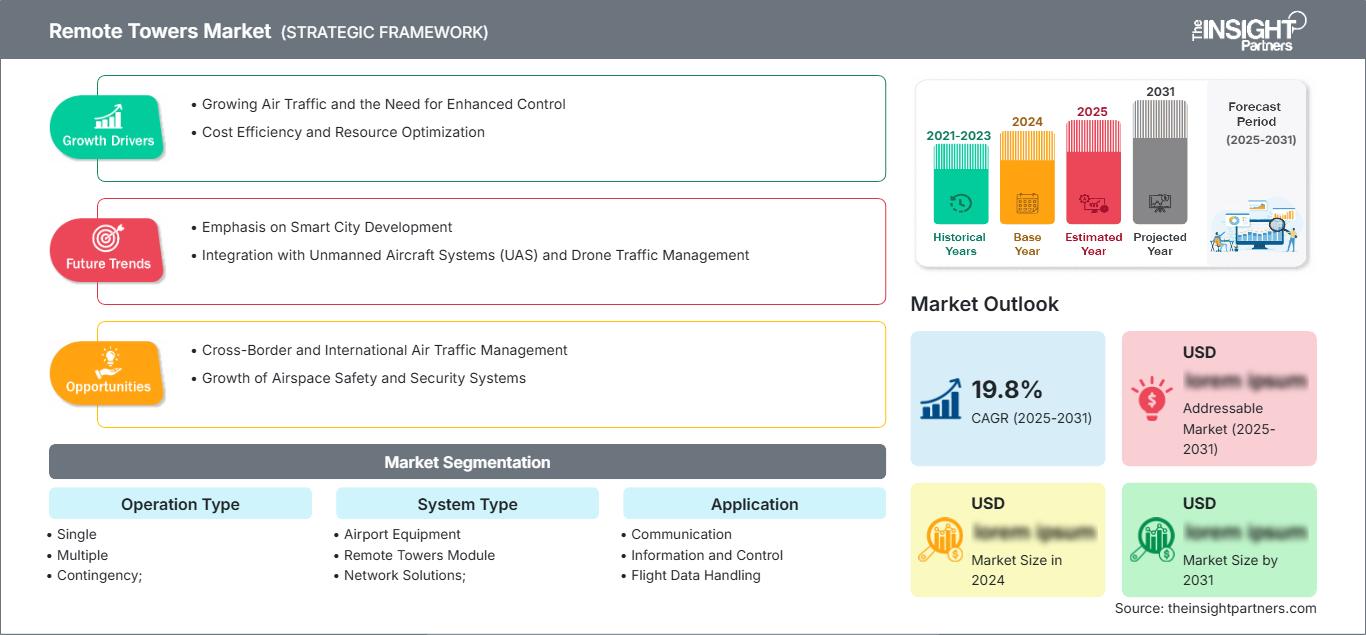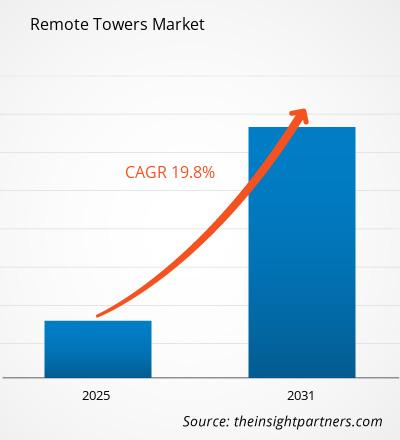Remote Towers Market Outlook, Segments, Geography, Dynamics, and Insights by 2031
Remote Towers Market Size and Forecasts (2021 - 2031), Global and Regional Share, Trends, and Growth Opportunity Analysis Report Coverage: By Operation Type (Single, Multiple, Contingency); System Type (Airport Equipment, Remote Towers Module, Network Solutions); Application (Communication, Information and Control, Flight Data Handling, Surveillance, Visualization) , and Geography (North America, Europe, Asia Pacific, and South and Central America)
Historic Data: 2021-2023 | Base Year: 2024 | Forecast Period: 2025-2031- Report Date : Apr 2026
- Report Code : TIPRE00004782
- Category : Aerospace and Defense
- Status : Upcoming
- Available Report Formats :


- No. of Pages : 150
The Remote Towers Market size is expected to reach US$ 0.66 billion by 2031. The market is anticipated to register a CAGR of 22.3% during 2025-2031.
Remote Towers Market covers analysis By Operation Type (Single, Multiple, Contingency); System Type (Airport Equipment, Remote Towers Module, Network Solutions); Application (Communication, Information and Control, Flight Data Handling, Surveillance, Visualization) , and Geography (North America, Europe, Asia Pacific, Middle East and Africa, and South and Central America)
Purpose of the Report
The report Remote Towers Market by The Insight Partners aims to describe the present landscape and future growth, top driving factors, challenges, and opportunities. This will provide insights to various business stakeholders, such as:
- Technology Providers/Manufacturers: To understand the evolving market dynamics and know the potential growth opportunities, enabling them to make informed strategic decisions.
- Investors: To conduct a comprehensive trend analysis regarding the market growth rate, market financial projections, and opportunities that exist across the value chain.
- Regulatory bodies: To regulate policies and police activities in the market with the aim of minimizing abuse, preserving investor trust and confidence, and upholding the integrity and stability of the market.
Remote Towers Market Segmentation Operation Type
- Single
- Multiple
- Contingency;
System Type
- Airport Equipment
- Remote Towers Module
- Network Solutions;
Application
- Communication
- Information and Control
- Flight Data Handling
- Surveillance
- Visualization
Geography
- North America
- Europe
- Asia-Pacific
- South and Central America
- Middle East and Africa
Customize This Report To Suit Your Requirement
Get FREE CUSTOMIZATIONRemote Towers Market: Strategic Insights

-
Get Top Key Market Trends of this report.This FREE sample will include data analysis, ranging from market trends to estimates and forecasts.
Remote Towers Market Growth Drivers
- Growing Air Traffic and the Need for Enhanced Control: Growth in global air traffic is another key factor propelling growth of the remote towers market. With more people flying, they also manage more aircraft, often to the point where it becomes nearly impossible to manage surface or sky air traffic. Remote tower systems are capable of reducing this problem to an extent by allowing better traffic control and thus better organization. This is particularly relevant in developing airline markets where basic systems of managing air traffic could be overwhelmed with demand. In other words, given how critical air traffic management is for safety and ability to perform optimally, this makes remote towers a notable aviation system.
- Cost Efficiency and Resource Optimization: One of the key drivers for the remote towers market is the significant cost savings associated with remote tower systems. By reducing the need for on-site air traffic controllers and expensive infrastructure for each airport, airlines and air navigation service providers can lower operational costs. Remote towers allow for the consolidation of air traffic control services across multiple smaller airports, increasing resource efficiency and reducing redundancy in personnel and equipment. This cost-effective model is driving the adoption of remote towers, particularly in regions with smaller airports.
Remote Towers Market Future Trends
- Emphasis on Smart City Development: With most urban centers adopting smart city technologies, the development of remote tower systems as part of wider smart city projects creates an opportunity for urban air mobility solutions. This may be just a healthy bystander to such a development together with improving the urban traffic management systems and more so the design of the seamless sky. Most of the developing countries are looking inwards into their infrastructure base building them to enhance their compounded economic growth and strengthening.
- Integration with Unmanned Aircraft Systems (UAS) and Drone Traffic Management: As the use of drones and unmanned aerial vehicles (UAVs) continues to rise, integrating remote tower systems with unmanned aircraft traffic management (UTM) solutions will be increasingly important. Remote towers will need to evolve to accommodate the unique challenges posed by UAVs, such as lower altitudes, high volumes of small aircraft, and the need for automated traffic management. Future remote towers will be equipped with the capability to manage both traditional manned aircraft and UAVs, helping to create a more seamless airspace for all types of aircraft.
Remote Towers Market Opportunities
- Cross-Border and International Air Traffic Management: The ability to manage air traffic across multiple countries from a centralized location presents a major opportunity for remote towers. Remote tower technology enables the coordination of air traffic across borders, optimizing air traffic flow, reducing delays, and improving safety in crowded airspace. Countries or regions with high air traffic can collaborate on remote tower solutions, reducing costs and increasing efficiency while maintaining safety and compliance with international aviation standards.
- Growth of Airspace Safety and Security Systems: With growing concerns about airspace security, there is an increasing demand for advanced air traffic control systems that enhance safety and monitor aircraft activity in real-time. Remote tower solutions can be integrated with advanced security systems, such as radar and surveillance cameras, to detect and track unauthorized aircraft and other potential security threats. The opportunity to enhance airspace security while reducing operational costs presents a strong business case for remote tower solutions in the defense and security sectors.
Remote Towers
Remote Towers Market Regional InsightsThe regional trends and factors influencing the Remote Towers Market throughout the forecast period have been thoroughly explained by the analysts at The Insight Partners. This section also discusses Remote Towers Market segments and geography across North America, Europe, Asia Pacific, Middle East and Africa, and South and Central America.
Remote Towers Market Report Scope
| Report Attribute | Details |
|---|---|
| Market size in 2024 | US$ XX Million |
| Market Size by 2031 | US$ 670.8 Million |
| Global CAGR (2025 - 2031) | 22.3% |
| Historical Data | 2021-2023 |
| Forecast period | 2025-2031 |
| Segments Covered |
By Operation Type
|
| Regions and Countries Covered |
North America
|
| Market leaders and key company profiles |
|
Remote Towers Market Players Density: Understanding Its Impact on Business Dynamics
The Remote Towers Market is growing rapidly, driven by increasing end-user demand due to factors such as evolving consumer preferences, technological advancements, and greater awareness of the product's benefits. As demand rises, businesses are expanding their offerings, innovating to meet consumer needs, and capitalizing on emerging trends, which further fuels market growth.

Key Selling Points
- Comprehensive Coverage: The report comprehensively covers the analysis of products, services, types, and end users of the Remote Towers Market, providing a holistic landscape.
- Expert Analysis: The report is compiled based on the in-depth understanding of industry experts and analysts.
- Up-to-date Information: The report assures business relevance due to its coverage of recent information and data trends.
- Customization Options: This report can be customized to cater to specific client requirements and suit the business strategies aptly.
The research report on the Remote Towers Market can, therefore, help spearhead the trail of decoding and understanding the industry scenario and growth prospects. Although there can be a few valid concerns, the overall benefits of this report tend to outweigh the disadvantages.
Frequently Asked Questions
Naveen is an experienced market research and consulting professional with over 9 years of expertise across custom, syndicated, and consulting projects. Currently serving as Associate Vice President, he has successfully managed stakeholders across the project value chain and has authored over 100 research reports and 30+ consulting assignments. His work spans across industrial and government projects, contributing significantly to client success and data-driven decision-making.
Naveen holds an Engineering degree in Electronics & Communication from VTU, Karnataka, and an MBA in Marketing & Operations from Manipal University. He has been an active IEEE member for 9 years, participating in conferences, technical symposiums, and volunteering at both section and regional levels. Prior to his current role, he worked as an Associate Strategic Consultant at IndustryARC and as an Industrial Server Consultant at Hewlett Packard (HP Global).
- Historical Analysis (2 Years), Base Year, Forecast (7 Years) with CAGR
- PEST and SWOT Analysis
- Market Size Value / Volume - Global, Regional, Country
- Industry and Competitive Landscape
- Excel Dataset
Recent Reports
Testimonials
The Insight Partners' SCADA System Market report is comprehensive, with valuable insights on current trends and future forecasts. The team was highly professional, responsive, and supportive throughout. We are very satisfied and highly recommend their services.
RAN KEDEM Partner, Reali Technologies LTDsI requested a report on a very specific software market and the team produced the report in a few days. The information was very relevant and well presented. I then requested some changes and additions to the report. The team was again very responsive and I got the final report in less than a week.
JEAN-HERVE JENN Chairman, Future AnalyticaWe worked with The Insight Partners for an important market study and forecast. They gave us clear insights into opportunities and risks, which helped shape our plans. Their research was easy to use and based on solid data. It helped us make smart, confident decisions. We highly recommend them.
PIYUSH NAGPAL Sr. Vice President, High Beam GlobalThe Insight Partners delivered insightful, well-structured market research with strong domain expertise. Their team was professional and responsive throughout. The user-friendly website made accessing industry reports seamless. We highly recommend them for reliable, high-quality research services
YUKIHIKO ADACHI CEO, Deep Blue, LLC.This is the first time I have purchased a market report from The Insight Partners.While I was unsure at first, I visited their web site and felt more comfortable to take the risk and purchase a market report.I am completely satisfied with the quality of the report and customer service. I had several questions and comments with the initial report, but after a couple of dialogs over email with their analyst I believe I have a report that I can use as input to our strategic planning process.Thank you so much for taking the extra time and making this a positive experience.I will definitely recommend your service to others and you will be my first call when we need further market data.
JOHN SUZUKI President and Chief Executive Officer, Board Director, BK TechnologiesI wish to appreciate your support and the professionalism you displayed in the course of attending to my request for information regarding to infectious disease IVD market in Nigeria. I appreciate your patience, your guidance, and the fact that you were willing to offer a discount, which eventually made it possible for us to close a deal. I look forward to engaging The Insight Partners in the future, all thanks to the impression you have created in me as a result of this first encounter.
DR CHIJIOKE ONYIA MANAGING DIRECTOR, PineCrest Healthcare Ltd.Reason to Buy
- Informed Decision-Making
- Understanding Market Dynamics
- Competitive Analysis
- Identifying Emerging Markets
- Customer Insights
- Market Forecasts
- Risk Mitigation
- Boosting Operational Efficiency
- Strategic Planning
- Investment Justification
- Tracking Industry Innovations
- Aligning with Regulatory Trends





 Get Free Sample For
Get Free Sample For